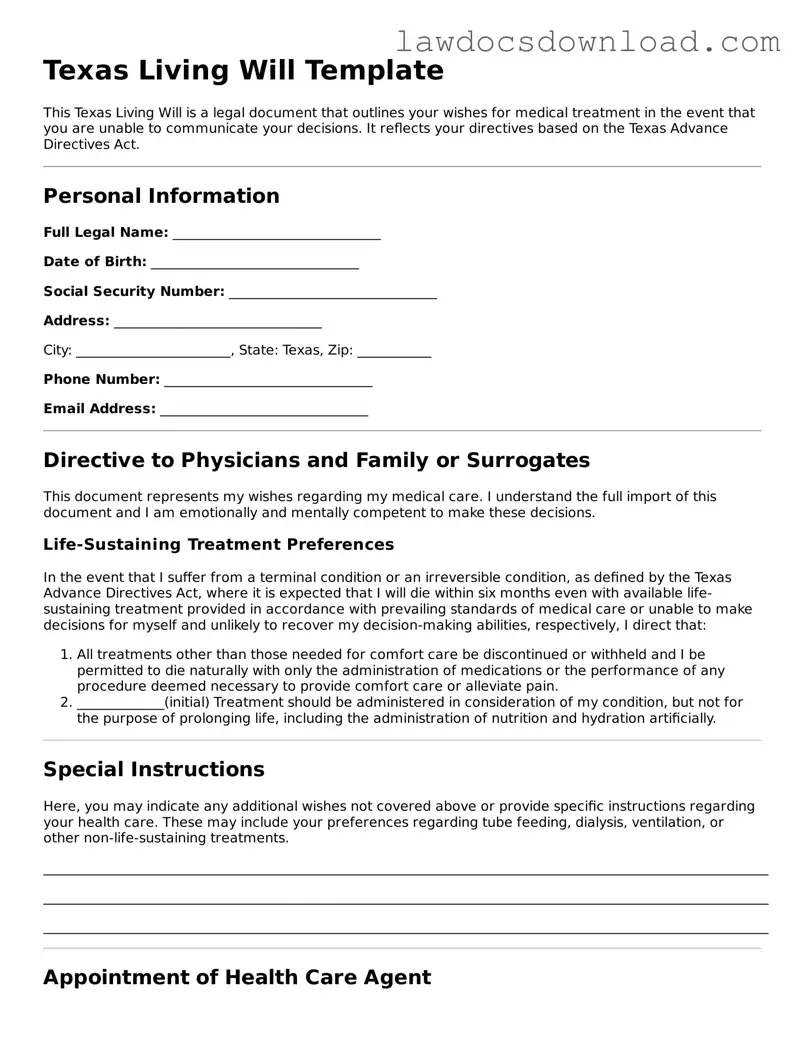Texas Living Will Template
This Texas Living Will is a legal document that outlines your wishes for medical treatment in the event that you are unable to communicate your decisions. It reflects your directives based on the Texas Advance Directives Act.
Personal Information
Full Legal Name: _______________________________
Date of Birth: _______________________________
Social Security Number: _______________________________
Address: _______________________________
City: _______________________, State: Texas, Zip: ___________
Phone Number: _______________________________
Email Address: _______________________________
Directive to Physicians and Family or Surrogates
This document represents my wishes regarding my medical care. I understand the full import of this document and I am emotionally and mentally competent to make these decisions.
Life-Sustaining Treatment Preferences
In the event that I suffer from a terminal condition or an irreversible condition, as defined by the Texas Advance Directives Act, where it is expected that I will die within six months even with available life-sustaining treatment provided in accordance with prevailing standards of medical care or unable to make decisions for myself and unlikely to recover my decision-making abilities, respectively, I direct that:
- All treatments other than those needed for comfort care be discontinued or withheld and I be permitted to die naturally with only the administration of medications or the performance of any procedure deemed necessary to provide comfort care or alleviate pain.
- _____________(initial) Treatment should be administered in consideration of my condition, but not for the purpose of prolonging life, including the administration of nutrition and hydration artificially.
Special Instructions
Here, you may indicate any additional wishes not covered above or provide specific instructions regarding your health care. These may include your preferences regarding tube feeding, dialysis, ventilation, or other non-life-sustaining treatments.
____________________________________________________________________________________________________________
____________________________________________________________________________________________________________
____________________________________________________________________________________________________________
Appointment of Health Care Agent
If I become incapable of making my own health care decisions, I designate the following individual as my health care agent:
Name: _______________________________
Relationship: _______________________________
Phone Number: _______________________________
Alternate Phone Number: _______________________________
This person is authorized to make health care decisions on my behalf, considering my desires as expressed in this document, to the extent permitted by law.
Signature
I understand that this living will represents my wishes regarding medical treatment. I am over the age of 18 and understand the full import of this declaration.
Signature: _______________________________
Date: _______________________________
Witnesses
The signing of this document was witnessed by:
- Name: _______________________ Signature: _______________________ Date: _______________________
- Name: _______________________ Signature: _______________________ Date: _______________________
This document does not authorize the provision, withholding, or withdrawal of health care to the extent prohibited by law.

